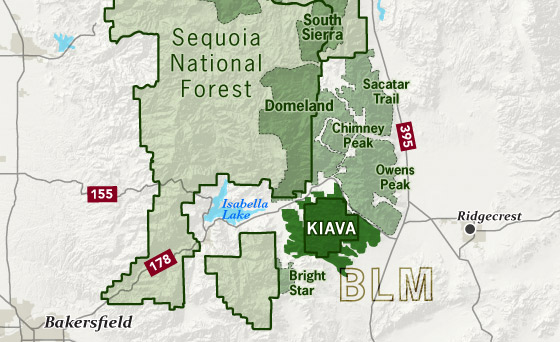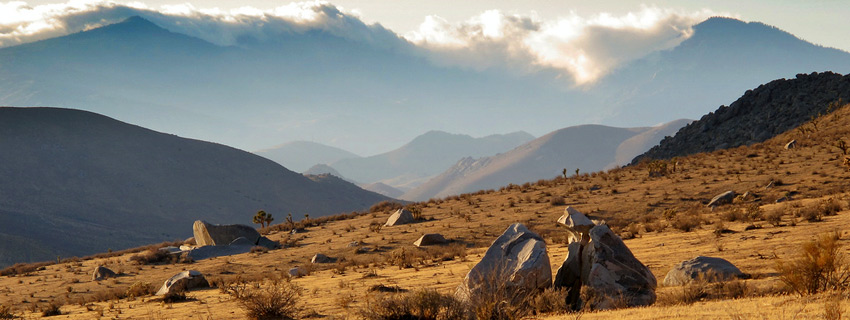
Encompassing most of the eroded hills, canyons, and bajadas of the Scodie Mountains in the southern Sierra, the Kiavah Wilderness was protected in 1994 under the California Desert Protection Act. The Kiavah’s 88,290 acres receives a mere 10-15 inches of precipitation annually.
The Kiavah’s varied vegetation provides habitat for a broad range of migratory birds such as the rough-legged hawk, yellow-headed blackbird, gray-crowned rosy finch , and sage sparrow. The stark contrast of desert plants such as cactus, cresote bush, Joshua tree, burro bush, or Shadseale within a 100 yards of pinyon pine, juniper, canyon oak or grey pine is quite startling. The Kiavah’s bajadas – the foot slopes of desert mountains where eroded soil and rocks have accumulated – are home to yellow-eared pocket mice and a plethora of lizards as well as the raptors who prey on them.
This wilderness area is part of National Cooperative Land and Wildlife Management Area and the BLM Jawbone Butterbredt Area of Critical Environmental Concern, which was designated to protect outstanding wildlife and Native American Values.
WILDERNESS PERMITS
No permit is required for camping in the Kiavah Wilderness - go for it! Camping is limited to 14 days, after which visitors must relocate at least 25 miles from their previous site.
MAXIMUM GROUP SIZE
No more than 15 people and 25 head of stock are allowed on overnight trips. Why?
BEARS AND FOOD STORAGE
Black bears are generally not a problem in the Kiavah Wilderness, but it is always advisable to store your food properly.
CAMPFIRES
Campfires are generally allowed with a valid California campfire permit, but keep up to date with current restrictions. Gathering wood for campfires is limited to dead and down materials. Live vegetation cannot be cut.
PETS
Domestic pets are allowed so long as they are under control and do not harass wildlife.
OTHER CONSIDERATIONS
- Horses are permitted, however, you may be required to carry weed-free feed.
- Removal, disturbance, or attempting to remove archaeological materials is a felony. Selling, receiving, purchasing, transporting, exchanging, or offering to do so is prohibited by law.
CONTACT
Bureau of Land Management
Bakersfield Field Office
3801 Pegasus Drive
Bakersfield, CA 93308
(661) 391-6000
Ridgecrest Field Office
300 S. Richmond Road
Ridgecrest, CA 93555
(760) 384-5400
